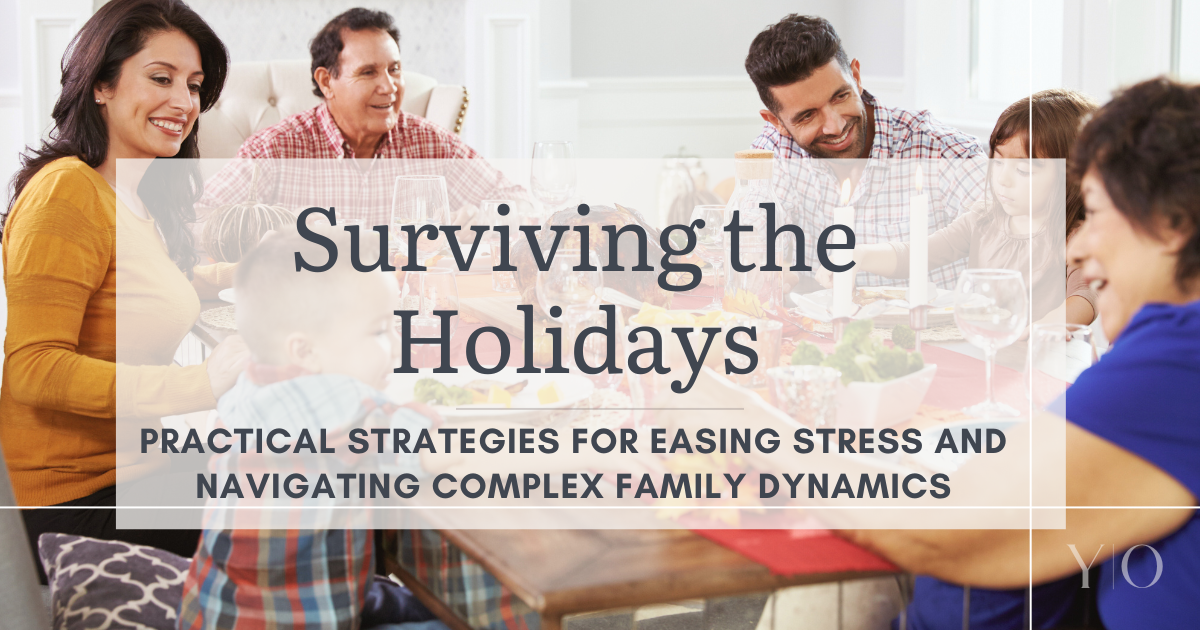Practical Strategies for Easing Stress and Navigating Complex Family Dynamics
The holiday season can be a time of warmth, connection, and celebration, but it can also surface tension, unsolicited advice, or emotionally charged family dynamics. Even with the best intentions, gatherings may bring complicated feelings, unhelpful comments, or difficult memories. If you’ve ever left a holiday event feeling drained, frustrated, or caught off guard by someone’s question or behavior, you are not alone. The good news? You don’t have to brace yourself or stay silent. With a little preparation and a few grounding tools, you can navigate these moments with greater clarity, self-trust, and emotional steadiness even if the dynamics around you stay the same.
Table of Contents
Why It Feels So Personal
Unsolicited advice and family tension can activate deep emotional responses. A comment about your relationship, job, body, or life choices might feel like a judgment or reopen an old wound. And family roles like being the “fixer,” the “quiet one,” or the “one who never speaks up” often show up in subtle, but powerful ways during these gatherings. You can’t control how others behave, but you can control how you show up. You have a right to your boundaries, your space, and your emotional well-being.
Why People Give Unsolicited Advice
Unsolicited advice is often less about you and more about the person giving it. It may come from a genuine desire to help, a discomfort with silence, or a need to feel useful or in control. For some, especially across generations, giving advice is a learned way of showing care, even if it lands poorly. Reminding yourself that their comment likely reflects their own lens or anxiety (not your worth or choices) can help you depersonalize the moment and stay grounded.
Skillful Strategies for Navigating Holiday Gatherings
Below are tools to help you respond with intention whether you are handling awkward questions, managing tension, or simply trying to stay grounded.
- Plan Ahead: Grounding & Intention
Before the gathering, give yourself a few moments to center and ground. A few deep breaths, a short walk, or a brief meditation can help you feel more emotionally steady. You can also set an intention for how you want to show up. Try, “I will stay calm and grounded, even if things get tense,” or“I can let people have their experience without making it mine.” Taking time to regulate your nervous system ahead of time helps you respond thoughtfully instead of reacting in the moment. - Clarify What You Can (and Can’t) Control
You can’t change how someone else behaves or thinks, but you can control your responses and boundaries. Try this reframe, “I don’t need to fix everything. I can let others have their experience. I just need to take care of myself.” Focusing on what’s within your control helps you stay grounded, even when the situation around you is not. - Respond, Don’t React
If a conversation becomes emotionally charged or someone catches you off guard, and you feel the urge to jump in or defend yourself, pause. A brief moment of stillness allows you to shift from reactivity to clarity. It gives you space to ask yourself, “Is this worth engaging in? Would silence or a redirection be more skillful? Can I step away without explaining?” A calm, grounded response is often more impactful than a perfect comeback. - Set Boundaries Without Blame
You can be both kind and clear. Boundaries don’t have to sound harsh, they can sound like care. Try, “I’d prefer not to talk about that today,” “Let’s keep the conversation light, it’s the holidays,” “Let’s catch up about that another time,” or “Thank you for asking. That’s something I’m still figuring out.” Remember, boundaries are not about changing others, they are about protecting your peace. - Use Humor or Playfulness (If It Feels Right)
Sometimes light-hearted responses can shift energy. Try, “Uh oh, are we doing the personal questions part of dinner already?” or “If I answer that, I get to ask one too, right?” or “Careful, that question might land you on the Naughty List.” Only use humor if it feels authentic and safe for you. - Have an Exit Plan
It’s okay to leave early, take a walk, or pause in another room. Stepping away can be a boundary in action. Plan ahead by texting a friend, setting a time limit, or identifying a way to take space if you need it. Remember, it’s perfectly reasonable to limit the amount of time you spend at a gathering, especially if it helps protect your emotional well-being. Connection is not measured by how long you stay, but by how present and grounded you are able to be. Quality over quantity. - Practice Compassion (for Yourself and Others)
Compassion doesn’t mean you have to agree or stay silent, it means recognizing that everyone has their own struggles and baggage. You might say to yourself, “They’re doing the best they can from their level of awareness, even if it’s not what I need.” This internal posture helps soften reactivity and keeps you in a place of strength and steadiness. - If You’re the One Giving Advice…
Before jumping in to offer tips or solutions, ask yourself, “Is this person asking for advice or just needing to feel heard?” or “Will my comment feel supportive or like pressure?” Presence, validation, and listening are often more helpful than fixing. - After the Gathering: Tend to Your Nervous System
Even smooth gatherings can be emotionally draining. Give yourself time to decompress and reconnect with yourself. Try journaling about what went well, noting how you handled a difficult moment differently, resting, walking, or engaging in something that soothes your nervous system. Tending to your nervous system after the fact is honoring the energy it took to show up with intention.
Final Thoughts
The holidays can bring a mix of joy and discomfort, and both are valid. You are allowed to have boundaries. You are allowed to prioritize your peace. Give yourself permission to step away from conversations, roles, or expectations that no longer serve you. Showing up with clarity, compassion, and intention doesn’t mean every moment will be easy, but it does mean you are protecting your energy and honoring your emotional well-being. That’s not selfish, it’s skillful.
Looking for Support Beyond the Holidays?
If navigating family dynamics or emotional stress feels especially heavy this season, therapy can help. Dr. Oren offers compassionate, evidence-based support to help you build boundaries, reconnect with your values, and move through relationships and life with more ease and intention. You don’t have to do it alone. Call 775-525-8100 to schedule your free 15-minute consultation and take the first step toward a calmer, more grounded you.
Please note that the information provided in this blog post is for informational purposes only and is not intended as a substitute for professional therapy or mental health treatment.
Learn More: Expert Advice and References
- American Psychological Association (APA)
Discusses managing family conflict, emotional triggers, and ways to approach difficult conversations.
https://www.apa.org/topics/stress/family-arguments-holidays - Conflict Resilience: Negotiating Disagreement Without Giving Up or Giving In
by Robert Brodone and Joel Salinas, M.D.
A science-backed guide to managing conflict with clarity, emotional steadiness, and compassion without abandoning your values or giving in to pressure.
Support your local Library or Buy on Amazon | Barnes and Noble | Thriftbooks
**Note: Dr. Oren does not receive compensation from the purchase of any recommended books - Greater Good Science Center
Insight into the power of compassion and emotional regulation.
https://greatergood.berkeley.edu/article/item/the_power_of_self_compassion - Harvard Health Publishing
Explores mindfulness and how it can help regulate emotions and improve responses to stress.
https://www.health.harvard.edu/mind-and-mood/how-to-reduce-stress-and-anxiety-through-movement-and-mindfulness - Mayo Clinic
Offers guidance on setting healthy boundaries and coping with family stress.
https://www.mayoclinichealthsystem.org/hometown-health/speaking-of-health/setting-boundaries-for-well-being - National Alliance on Mental Illness (NAMI)
Tips on surviving the holidays and maintaining mental health when dealing with challenging family dynamics.
https://www.nami.org/from-the-ceo/the-most-difficult-time-of-the-year-mental-health-during-the-holidays/



